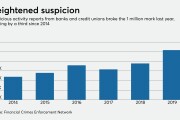WASHINGTON — The Treasury Department
The rule is part of the Corporate Transparency Act, which requires businesses to report their beneficial ownership information directly to a registry database maintained by the Financial Crimes Enforcement Network. It's meant to crack down on anonymous shell companies in the United States, and the rule included a major benefit for banks: getting them out of the business of having to collect beneficial ownership information on their clients.
Banks have, for years, argued that doing due diligence on their legal entity customers is timely and expensive. The CTA would shift a bulk of that responsibility to legal entities, who would be required to send the information to Fincen's database. Banks would use that database, significantly cutting costs while, they argue, having more effective tools to help law enforcement and police their own accounts.
But Fincen has yet to build out the database, or introduce rules about who can access it. The bureau also hasn't updated the rule that would modify banks' due diligence requirements in response to the law's changes. And Fincen didn't give any details on when banks can expect them to tackle those rules when they finalized the first part of the law last week.

Until those changes are made, analysts said it's unclear to what degree the CTA will actually cut down on banks' regulatory burden. That leaves banks in a holding pattern, maintaining and growing their own due diligence operations, without any timeline on the rest of the promised relief.
"It remains to be seen how useful the registry will be to banks, and whether it will add to or reduce their regulatory burden," said Daniel Stipano, a partner in Davis Polk's financial services practice.
And it could be months, or even years, until we find out those answers, far past the statutory deadline of Dec. 31, 2021. While lawmakers have repeatedly pushed Fincen to fully implement the law, the bureau said it's understaffed and underfunded.
"Limited resources have presented significant challenges to meeting the implementation requirements of our expanded mandate under the AML Act, including the CTA's beneficial ownership requirements," acting Director Himamauli Das told Congress in April. "As you are aware, we are missing deadlines, and we will likely continue to do so."
One of the most significant roadblocks is the manpower and resources that analysts say is required to build out that database. It would be difficult for Fincen, at this point, to develop the technological infrastructure to receive, store and provide regulated access to the database before companies are required to complete their beneficial ownership information on Jan. 1, 2025, said Nikhil Gore, a partner at Covington.
What happens if the database information contradicts banks' internal resources and to what degree banks will have access to the database are among the significant questions that remain unanswered until Fincen pursues its next two rulemakings on the CTA, Gore said.
It's difficult to see how effective the CTA will be without the next two rulemakings, leaving financial institutions in limbo in the meantime.
"The next rulemakings will be critical for shaping how banks and other users access this information and incorporate it into existing anti-money-laundering programs," said Erica Hanichak, government affairs director at the FACT Coalition, where she works on anti-laundering policies.
For the law to be effective, Hanichak said, Fincen will have to make sure banks have "uncomplicated" access to the database. She said that in its next rulemaking it will have to balance between banks' concerns that they won't have the tools to complete their obligations under the Bank Secrecy Act without complete access to the database, and concerns from reporting companies about privacy.
"Any further delay in implementing these rulemakings only increases some of these questions," she said.






